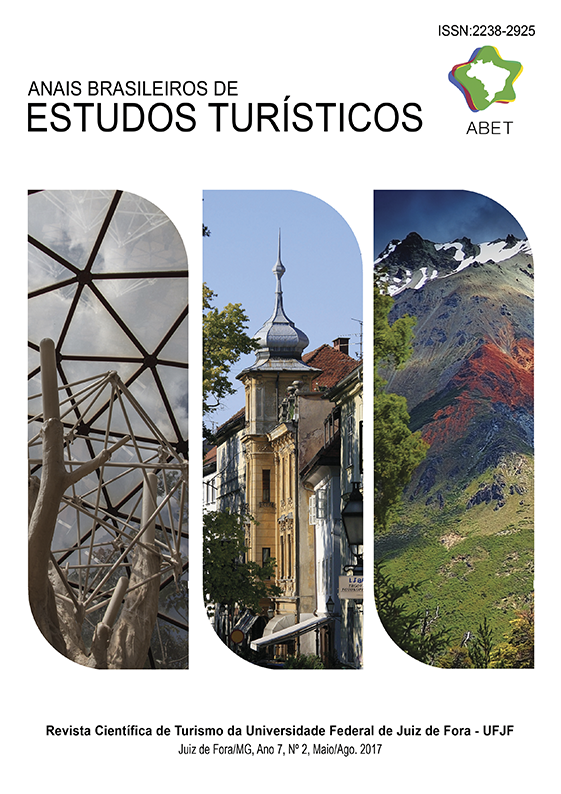Las Redes de Políticas y su Utilidad para el Análisis Turístico
DOI:
https://doi.org/10.34019/2238-2925.2017.v7.3166Keywords:
Redes de Políticas, Redes de Asunto, Comunidades Políticas, Interdependencia de RecursosAbstract
El objetivo de este artículo es desarrollar el posicionamiento teórico de las redes de política, a través de autores, conceptos y variables principales, y mostrar la utilidad que tiene para el análisis de la industria del turismo a través de los resultados de un estudio de caso. La primera sección del artículo desarrolla el concepto de redes de políticas, en la segunda sección se analiza la esencia de algunos modelos propuestos por los autores claves, en la tercera parte se presentan los conceptos y variables detectadas en la teoría de las redes de políticas, por último, se presentan las conclusiones permiten observar que analizar el turismo desde esta perspectiva permite entender cómo las políticas turísticas pueden mejorar esta industria a partir de la participación de los actores públicos y privados, los recursos que poseen y las formas de colaboración que establecen entre sí.Downloads
References
CASTILLO y VARGAS. Breve recuento de la modernización de la política turística mexicana. Teoría y Práxis, pp.9-34, Universidad de Quintana Roo, México, 2007.
COMPSTON, Hugh. Policy Networks and Policy Change: putting policy network theory to the test. Ed. PalgraveMacmillan. United Kingdom, 2009.
De la TORRE, O. El Turismo: fenómeno social. México, México: Fondo de Cultura Económica, 1997.
FREEMAN, L. J.; PARRIS, S. J. A theorical and conceptual reexamination of subsystem politics. Public Policy and Administration 2 (1), 1987.
HAAS, P. M. Introduction: Epistemic comunities and international policy coordination. International Organization 46 (1). pp. 1-35, 1992.
HECLO, H. Issue networks and the executive establishment. En: KING, Anthony (Ed.) The new American Political System. American Enterprise Institute for Public Policy Research. Washington, D.C. USA, 1978.
JAIMEZ, G. Políticas Públicas y Turismo. Sevilla, España, 2004. Disponible en: http://alud2.socialesyhumanas.dusto.es
JORDAN, A.G.; RICHARDSON, J. J. Policy comunities: The british and european policy style. Policy Studies Journal 11 (4) [Versión electrónica]. June. pp. 603-615, 1983.
KLIJN, E.H. Policy Networks: An Overview. En: KICKERT, W. J. M. & KOPPENJAN, J. F. (Eds.) Managing Complex Networks. Sage, London. (Trad.) Mariángela Petrizzo, 1998.
MAGAÑA, I. La política turística en México desde el modelo de calidad total: un reto de competitividad. Economía, Sociedad y Territorio, vol. IX, núm. 30, pp. 515-544, 2009. Disponible en: http://www.redalyc.org/pdf/111/11111267008.pdf
MARSH, D.; RHODES R. A. W. Policy comunities and issue networks. En: Policy networks in British politics. University Press Scholarship. pp. 1-15, 1992.
ORGANIZACIÓN MUNDIAL DEL TURISMO. Turismo de Cruceros. Situación actual y tendencias. OMT, Madrid España. Primera Edición, 2008.
PETERSON, J. Policy Networks. Political Science Series. Vienna, 2003.
SECTUR. Resumen Ejecutivo. Tendencias y Políticas Turísticas. SECTUR, 2010. Disponible en: ictur.sectur.gob.mx.
RHODES R.A.W. Policy network analysis. New York, U.S.A. Oxford University Press. pp. 425-447, 2006.
RHODES, R. A. W. Policy networks: A British Perspective. Journal of Theoretical Politics, 1990.
ZURBRIGGEN, C. Las redes de políticas públicas. Una revisión teórica. Instituto internacional de Gobernabilidad de Catalunya, 2003. pp. 1-15 Disponible en: http://www.iigov.org/documentos/?p=10105
ZURBRIGGEN, C. Redes, actores e instituciones. Revista del CLAD30 [Versión electrónica]. Caracas, Venezuela, 2004. Disponible en: http://old.clad.org/portal/publicaciones-delclad/revista-clad-reforma-democracia/articulos/030-octubre-2004/0051000
ZURBRIGGEN, C. La utilidad del análisis de redes de políticas públicas. Argumentos 24 (66) [Versión electrónica] México. pp. 1-29, 2011. Disponible en: http://www.scielo.org.mx/scielo.php?script=sci_arttext&pid=S0187-57952011000200008.
Downloads
Published
How to Cite
Issue
Section
License
This journal provides immediate open access to its content, following the principle that providing free scientific knowledge to the public provides greater democratization of world knowledge.
Authors must agree to the following terms relating to copyrights:
(a) Authors keep all copyright and grant the to the journal the right of first publication, with the work simultaneously licensed under the Creative Commons Attribution License that allowing job sharing with recognition of authorship of the work and initial publication in this journal.
(b) Authors are allowed to assume additional contracts separately, for non-exclusive distribution of the version of the work published in this journal (e.g. publish in institutional repository or book chapter), with recognition of authorship and initial publication in this magazine.
(c) Authors are allowed and are encouraged to publish and distribute their work online (e.g. in institutional repositories or on your personal page) since they do not do this before or during the editorial process, as this can generate productive interchange, as well as increase the impact and citation of work aired. (See Effect of Free Access).















